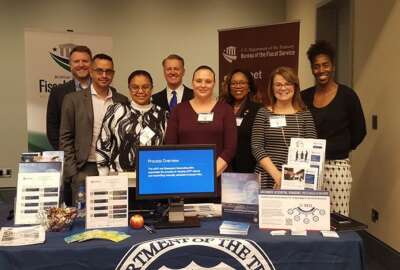DoD taking renewed interest in blockchain amid COVID-19 pandemic
Blockchain in recent years generated plenty of hype in the federal contracting community, but technology never resulted in many agencies moving forward with the...
Blockchain in recent years generated plenty of hype in the federal contracting community, but technology never resulted in many agencies moving forward with the technology.
The distributed ledger technology, however, has seen pockets of implementation in federal health agencies. Now in the midst of the COVID-19 pandemic, health executives in the Defense Department are once again looking at potential use cases for blockchain.
Bruce Doll, the assistant vice president for technology research and Innovation at DoD’s Uniformed Services University, said Wednesday that the Military Health System should consider blockchain for everything from credentialing providers at clinics to tracking the distribution of a COVID vaccine as part of Operation Warp Speed.
“You certainly want to be in a situation where you are able to track, whether it’s from Pfizer or Moderna, all the way to delivery to the patient, what is actually the quality of that series of steps,” Doll said Wednesday during a virtual health IT conference hosted by Federal Computer Week.
By using machine learning and AI, Doll said defense health agencies could clean and evaluate its fitness for use to reduce the risk of bad data making its way into the blockchain.
“Right now, if you use blockchain, there’s a risk that the data introduced is bad data, and unfortunately, badly introduced into a blockchain can be bad data forever,” he said.
Renewed interest in blockchain stems from a report commissioned by congressional leadership to explore the possibility of introducing blockchain into DoD. Potential applications include multi-factor authentication of individuals entering data into MHS systems.
“The idea of identifying friend or foe is elemental to environments that we work in, and then those identifications may only take seconds before a decision has to be made,” Doll said. “Having blockchain operating in that environment, so that you can actually have commands that can be conveyed forward in the field and then evaluated for correctness … would be a great advantage.”
The report also proposed that DoD consider using blockchain to reduce single points in failure on the battlefield or in emergency decision-making situations.
“There’s a lot going on, a number of factors have to be considered, especially things such as maintenance, orchestration, provisioning, and so it can exceed any single individual’s capacity to manipulate all of them for the advantage of making the best decision,” he said. “Using blockchain to establish a record of those decisions is one way to account for how we get from Step A to Step C.”
The commissioned report also recommended that DoD consider blockchain to improve the efficiency of its logistics and supply chains.
Renewed enthusiasm in blockchain, Doll said, hasn’t yet resulted in DoD moving ahead with new projects or pilots. For this distributed ledger technology to gain momentum, he said the agency needs to ensure its workforce has the skills necessary and leadership at the Defense Health Agency or the assistant secretary of defense for health affairs to make it a priority.
“You can understand the whole technology evolves, and I think the phase it’s in currently remains one to be deliberately evaluated, before rolling out a pilot within the Military Health System,” Doll said.
The Department of Health and Human Services has pioneered the use of blockchain in government. HHS in 2018 gained the first authority to operate an a blockchain and AI-powered tool called HHS Accelerate.
Meanwhile, the Food and Drug Administration has looked at using distributed ledger technology to monitor the global food supply chain and pinpoint the source of food safety concerns.
Copyright © 2025 Federal News Network. All rights reserved. This website is not intended for users located within the European Economic Area.
Jory Heckman is a reporter at Federal News Network covering U.S. Postal Service, IRS, big data and technology issues.
Follow @jheckmanWFED






